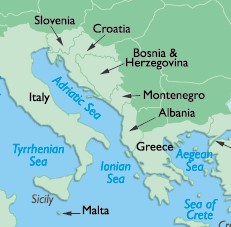Why do borders matter so much?
At one level, I can see that good fences make good neighbours. It helps to know where you stand and sets limits around acceptable and unacceptable behaviour. But we can manage without fences. I live in a suburb with open lawns. Cats and toddlers run free but neighbours know exactly where to mow and where to stop. In my last house there was a right of way running under my kitchen window. No-one ever used it and I saw no reason to worry about it.
But beyond that, recent experience has shown that a lot of borders do no really matter.
Consider this part of the world:

We recently travelled from Athens to Venice by ship, calling in at places in the Balkans where in recent times new countries have formed and new borders have been drawn up. Travelling by sea is an ancient way of travel – you can’t draw a line in the sea and as a passenger you are unencumbered by port protocol and are free to perceive an almost seamless transition from one landscape to another until eventually the mountains and rocky outcrops of Athens have been completely replaced by the flat landscape of Venice. Athens, Venice, two very different cities. Different landscape, different alphabet, different language. But where exactly is the border between the two?
Well somewhere in what was once Yugoslavia I suppose. But the first border, after we left Corfu, now Greek, and before we docked at Sarande in Albania, passed without our noticing it. The excursion in Albania was to the archaeological site at Butrint, remarkable for its many layers of finds which reflect the history of the settlement as Greek colony became Roman pagan city became Roman Christian town became Byzantine, until finally the Ottomans presided over its gradual demise and the marshlands took over. Can such a monument belong to one country? Its borders are historical not geopolitical. Overnight we must have passed from Albania to Montenegro, for next day we cruised Kotor Bay, but again, what border? What difference? The landscape was rocky and mountainous but little settlements had developed at the edge of the sea, just as they have in the Austrian and Swiss Alps, or alongside the big rivers of Europe. At first, it looked like Switzerland with sea or a Rhineland vista without the Rhine. Three stops in Croatia – Dubrovnik, Split and Zadar – were the highlight of the tour but with a lingua franca of English, we had no way of telling whether we had crossed a national border or simply moved on within the same country. Ravenna, on the opposite shore of the Adriatic, should have felt different but when we went to see the Byzantine mosaics, there was immediately a stronger link to the icons and mosaics we had seen in Athens and in Corfu than to Italy. All these places have more in common than that which divides them, as we now say proudly.
All these places are now learning to get along with each other, and for the benefit of tourists, probably, they now don’t put on display too many of the cracks, although you can visit the site in Dubrovnik from where the city was shelled not so long ago. But what is it that they have in common? They have conquerors in common, it is true. Between them they have been conquered by Romans, Byzantines, Venetians, Turks, Brits and probably a few others we’ve not heard about. The foreign armies and navies, even the British one, which marked its departure from Corfu by blowing up the ancient harbour defences so that no other power might have the use of them, are long since gone. What remains are the cultural transfers that those conquerors brought. Styles of art, foodstuffs and recipes, dance and music, mostly transferred by a kind of accident when a traveller from one city found he could make a fortune by selling something which was totally new in another. It all crossed borders.
Remarkably, in our time, these porous borders which allow shared culture, shared life, the whole fertile mix of liminality, have been multiplying. Remarkably, a new one was set up today.
